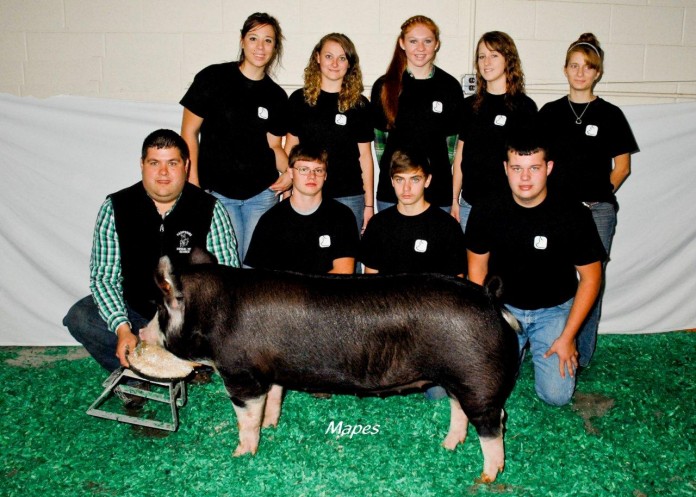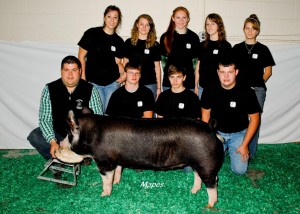ROMNEY, W. Va. — The students in Isaac Lewis’ agriculture veterinary class are getting a hands-on experience in taking care of swine.
Lewis teaches at Hampshire High School in West Virginia’s Hampshire County, where nearly half of the school’s 1,200 students study at least one agriculture class.
Five years ago, the staff and community worked together to start a Berkshire swine program and build a modern swine facility near the school.
They worked with renowned animal behaviorist Temple Grandin on the design, and the result was a 60 by 42-foot main building, along with a 30 by 30-foot office and nursery.
The facility was an immediate success and has offered hundreds of students the opportunity to feed, vaccinate and exhibit swine projects.
Winning ways
But the past year has arguably been the best. In early October, one of the program’s boars took champion Berkshire at the Keystone International Livestock Exposition in Harrisburg, Pa.
It was a complete turnaround from 2008, when Lewis took students and animals to the show and finished last.
“Five years ago, we were dead last in every class,” he said. “But some of the professional breeders saw the potential in a school program like this and sort of took us on as a pet project. They came to me and said, ‘we need to look at your nutrition, we need to look at your genetics, we need to get you on track.”
And “on track” they are, with the help of the West Virginia Department of Agriculture.
“This is an amazing achievement and just one small part of the agriculture curriculum at this school,” said West Virginia Commissioner of Agriculture Gus R. Douglass. “When I hear people asking where the next generation of farmers is going to come from, I can tell them, ‘I know where some of them are going to come from — Hampshire High School.”
Lewis said the swine program is “kid-driven” and allows them to participate in all aspects of swine care and exhibition. Many of the students do not have a facility for swine at home, so this facility is especially useful.
“It’s kind of like a group of bees. Everybody has a job,” Lewis said.
Those jobs help teach skills like being responsible, managing a schedule, communicating and marketing. It’s what Lewis calls “realistic career aspirations,” something he said “every employer on earth is looking for.”
Students learning
Senior Katelyn Alger did not grow up on a farm, but said she always had a “yearning” for working with farm animals. Now, she helps care for young piglets, fix broken equipment and administer medicine.
“I saw that this was an opportunity and I jumped on it,” she said. “These things aren’t cute little Barbie dolls; you can’t just carry them around in your purse.”
She’ll be going to college after graduation, to become a large animal veterinarian.
Junior Larry Shaffer is in his third year with the program, and like Alger, he does not have a farm background. He helps manage the feeding and delivery system, and hopes to one day be a veterinarian as well.
“It gives us a jump on everything else,” Shaffer said.
Shaffer said his best memory so far is watching the champion boar be born, and telling his teacher the boar would one day be a champ.
“I was there when he was born and I named him and I told (Mr.) Lewis he was going to be a champion,” Shaffer said. And look where we’re at now!”
Expanding production
The program currently raises about 30-40 head of piglets, in addition to six full-time sows. But Lewis said it will likely grow exponentially if some private grower contracts are approved.
“We don’t want to be a commercial feedlot,” he said, while noting there is a benefit to some growth.
Berkshires are an historical breed of swine first thought to have been discovered by Oliver Cromwell’s army during the English Civil War in the mid 1600s.
Berkshires are known for their marbling, tenderness and overall meat quality. They’re especially popular among East Coast diners and white table cloth restaurants.
“The culture of our area changed because of the influence” of the school’s Berkshires, Lewis said. Local people have “begun to notice the significance of the Berkshire pork quality.”
The school’s veterinary program also is finishing plans for a new $1.1 million laboratory building that will include classrooms and professional-grade lab facilities so students can do diagnostic work.
“The type of program that they’re talking about would go a long way in preparing students to be veterinary technicians and to do the type of animal health work we do in the department (of agriculture),” said Jewell Plumley, W. Va. state veterinarian. “While breeding and raising animals is an obvious agricultural career, people need to understand there are a wide range of professional opportunities in agriculture.”
Lewis said the swine program is just another way to teach, similar to sports and other extracurricular activities.
“Pigs are a catalyst,” he said. “A drum or a football or a basketball — those are all catalysts to teach kids. And we use pigs.”












Looking for a borer pigglet if selling please send some information. I would like to purchase one